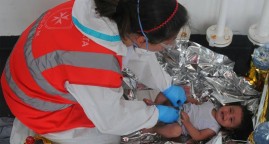Lebanon … perpetual refugee camps ?
In anticipation of the resumption of peace talks on Syria, Lebanon must act at national and international levels to address the serious consequences that could have the Syrian conflict on its security, its economy and its society.
While the “international community” affirms its commitment in principle to the stability of Lebanon, its actual policy on the massive Syrian exodus grows Lebanon to the brink. There is danger in delay, for already overcrowded and beset by internal divisions, Lebanon is experiencing a migration of unprecedented magnitude, and perhaps irreversible. His salvation resides in its determination and the will of the parties in the conflict and wchich have interest to stop it, and to act to:
- offering asylum to refugees according to quotas approved by the country;
- establishing secure areas in Syria.
In this context, Lebanon will have to review the current policies and institutional and logistical arrangements adjoining residence and refugee assistance.
Is the fate of Lebanon is to be forever refugee camp in the Middle East?
Carrying an unfair and unparalleled burden, Lebanon is the first among the host country for refugees probably in absolute terms, and certainly relative to its size and population. The civil war in Syria, which became a world conflict has uprooted half the population – seven million within the boundaries and five million beyond.
The fed inflows of Syrians in Lebanon have made a shelter for one million two hundred thousand registered refugees, in addition to the Syrians from Lebanon before the war, and sixty thousand Syrian births previously identified – a total that surpasses third of the four million residents Lebanese citizens.
This stream weighs a heavy toll on the national economy and on the budget and capacity, already deficient state to ensure the required utilities. The sudden 30% increase in demand without a corresponding increase in supply, creates an “economic shock” that begins the productivity of the economy and living standards, especially in Lebanon, far from having eliminated the consequences of its own civil war (1975-1990) and upgraded its infrastructure.
Induced effects of the Syrian war have damaged Lebanon and its dependent economy on political stability.
The implications are significant are for the lower level on investment and employment, obstruction to road transport and trade routes, and the decline of tourism. With the enormous pressure of refugees, the bill becomes prohibitive and beyond the tolerance threshold of the national economy and public finances. The annual cost of the crisis is estimated at:
- $ 2.5 billion in “loss of earnings” – the equivalent of 5% – of the gross domestic product;
- and US $ 1.7 billion in budgetary spending for health care, education (200,000 Syrians to 270,000 Lebanese in public schools), and various subsidies (electricity, water …) to refugees, and non-fiscal revenues performed due to a weakened economy.
The social impact on poor layers are less severe because the enormous flow of refugees increased labor, pushing down wage levels and living conditions. The deleterious effect was:
- doubling the unemployment rate from its level before the war, especially among unskilled workers in the poorest border regions and home to the largest contingent of refugees ;
- and adding 170,000 people to 1 million Lebanese living under the poverty line.
Complex and devastating, the Syrian conflict may portend a long stay, perhaps irreversible, of refugees in Lebanon.
“All refugees are not created equal.” Suppose these refugees have fled following the floods of the Euphrates. A record of the inventory fairly reliably determine the parameters, costs and duration of the rehabilitation required and the international community would work tirelessly to ensure a rapid return of the displaced.
For refugees in Lebanon is different because any forecast as to the duration and outcome of the conflict would be random.
What is certain by cons is that the scale of the devastation and depredation that the intensity of fighting has inflicted on the country will be that a long time will be needed to restore so little infrastructure, park housing, production facilities and livelihood once peace will be restored. The fact also that this same international community is involved in the conflict does not ensure its voluntary commitment to reconstruction efforts in any scenario return to peace.
Moreover, ethnic cleansing practiced by various groups to consolidate their territorial control will prevent the return of many Syrians at home they were expelled the story, including that of Lebanon, no shortage of such tragedies. All this will only continue, perhaps indefinitely, the presence in Lebanon of many Syrians. The statements of the UN Security Council on the “voluntary” return of refugees once peace is restored are, in this respect, ominous.
The fire which the outbreak occurred in Syria may spread, consumer Lebanon and further destabilize the region.
Among the adverse impact of the conflict on Lebanon, with no are no longer able to be contained. In some areas, the presence provided and extended refugees crowding out natives, in their own fief, the labor market and access to housing, fueling social conflict and digging a ditch of hostility and mistrust with communities ‘Home.
For Lebanon, mastering this aspect of the crisis is essential for the preservation of its demographic balance, regional, urban, environmental, economic and social. In addition, latent disputes inherent to the Lebanese-Syrian-regional relations, are a potential source of eruption of violence on Lebanese soil, as evidenced by the clashes “Jroud Ersal” who opposed, nearly 10% of the territory national, and al-Daech Nosra to the Lebanese army, and to each other.
The danger is compounded by the gulf between the Lebanese themselves about their positions and alliances for the war in Syria, which has already crossed the national border in both directions. Insecurity and instability are also a risk due to the inevitable infiltration of radical elements and criminals among successive waves of refugees.
Risks also arise from migrants living in desperate economic conditions that violate the law and order, or in unhealthy environments that increase the incidence and spread of disease.
Translate from french.
Read the article in french on the website of L’Orient-Le Jour
Related Articles
Why We Need a Global Business Council for Refugees
06/28/2017. As the largest wave of human displacement since World War II continues to unfold, an all-hands-on-deck response is required and must be scaled up.
Climate refugees: eternal “forgotten Law People”?
11/30/2015. Hundreds of millions of people are likely to leave their land due to the environmental problems.
Refugee Crisis: New Operation for Order of Malta Italian Relief Corps in the Aegean Sea
12/28/2015. “Aegean SAR Operation” is the name of the Order of Malta’s latest humanitarian mission.





